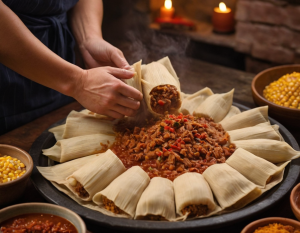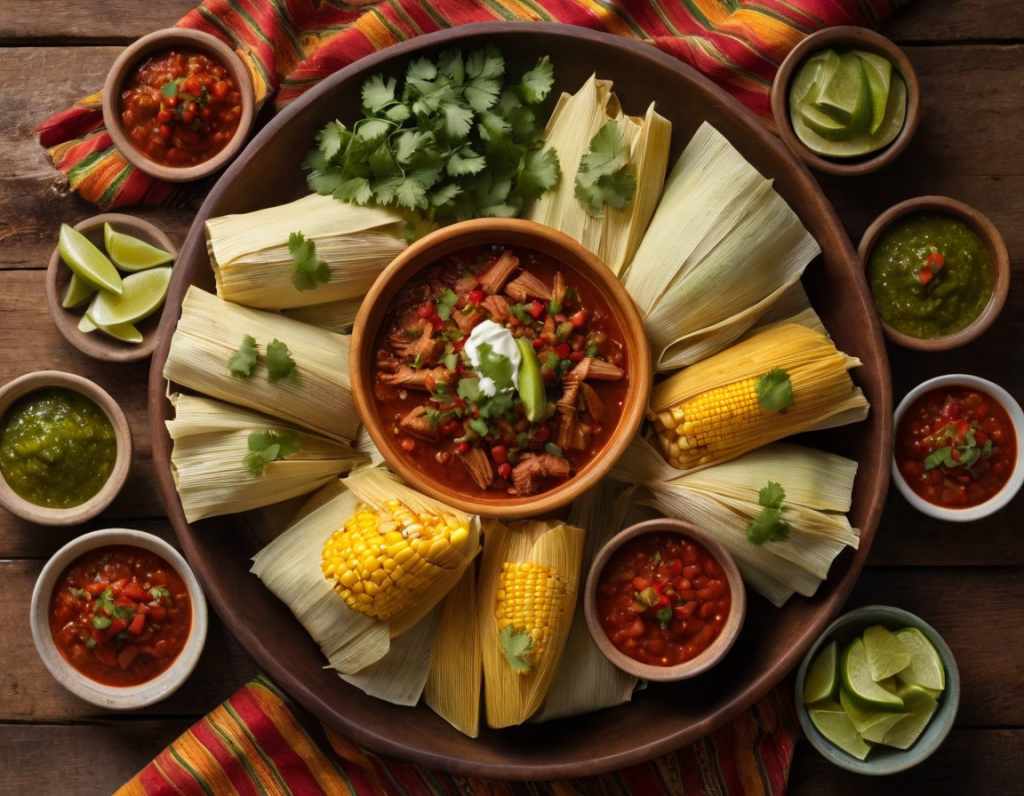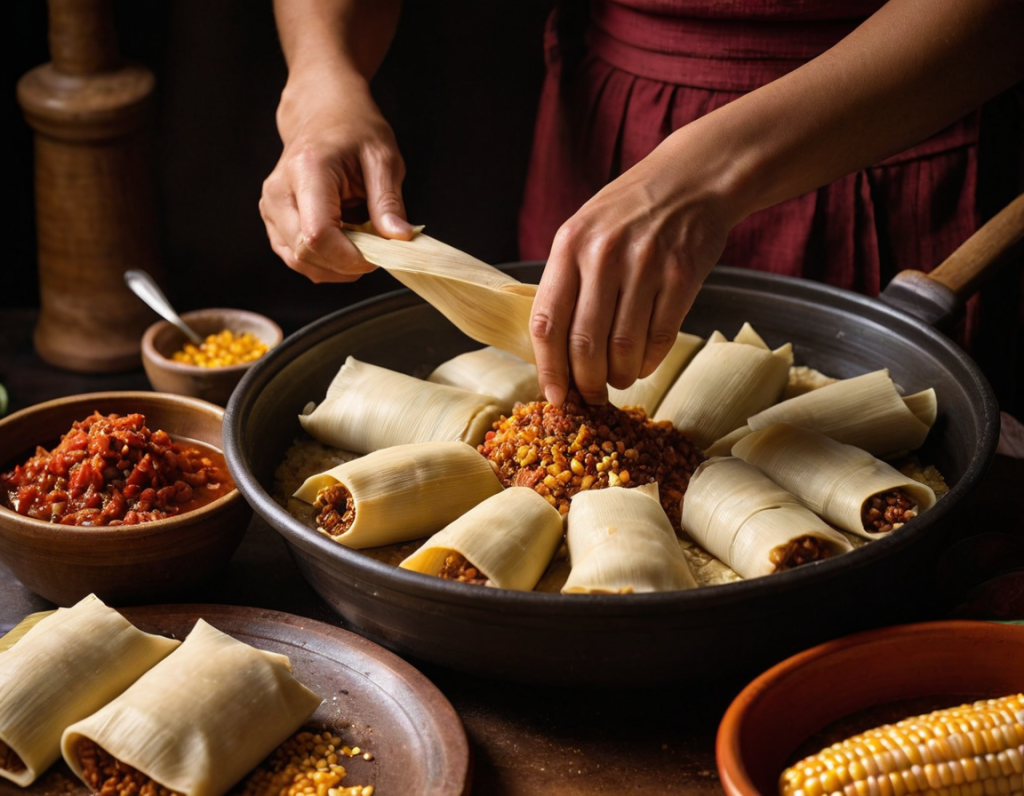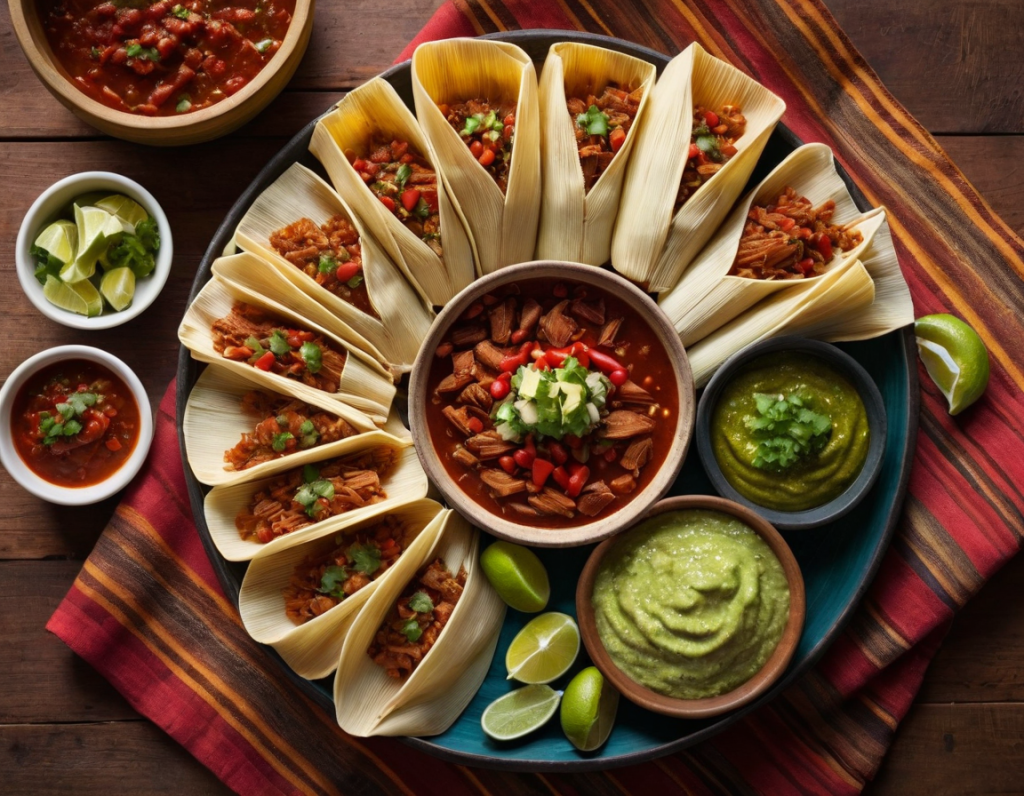Introduction
Few dishes evoke the warmth of family, tradition, and celebration like traditional tamales. These iconic Mesoamerican treats have been enjoyed for centuries, bringing people together for meals that celebrate heritage and togetherness. Whether served during a festive holiday, a casual family gathering, or simply as a delicious homemade meal, tamales are much more than just food—they’re a tradition wrapped in love.

But what exactly are tamales, and why are they so special?
At their heart, tamales are a labor of love. Made from masa dough, filled with a variety of savory or sweet fillings, and wrapped in corn husks or banana leaves, tamales are steamed to perfection. They’re as versatile as they are delicious, with countless regional variations to explore.
In this guide, we’ll dive deep into everything you need to know about traditional tamales:
- Their rich history and cultural importance.
- Step-by-step instructions for creating the perfect tamales at home.
- Tips, tricks, and variations to suit any occasion or dietary preference.
Whether you’re a seasoned cook looking to master the art of tamale-making or a curious foodie eager to explore a new culinary tradition, this guide has you covered. Let’s unwrap the secrets of making authentic traditional tamales!
What Are Traditional Tamales?
A Culinary Icon of Mesoamerican Culture
Tamales date back thousands of years to the civilizations of the Aztecs, Maya, and Olmecs. As a portable and hearty food, they were often prepared for warriors, travelers, and workers. Made from nixtamalized corn, tamales were a staple that fueled the growth of ancient Mesoamerican societies.
A Dish Steeped in Tradition
Today, tamales remain a cornerstone of Mexican culture and cuisine, playing a central role in celebrations like Día de los Muertos, Christmas, and family reunions. They’re also enjoyed across Latin America, with each region offering its unique twist on the dish.
Regional and Sweet Variations of Tamales
Regional Varieties in Mexico
- Oaxacan Tamales: Wrapped in banana leaves, often filled with mole.
- Yucatecan Tamales: Feature cochinita pibil, a slow-cooked pork dish.
Sweet Tamales
- Flavored masa with cinnamon or vanilla, filled with chocolate, pineapple, or raisins, and perfect for dessert.
Traditional Tamales: A Comprehensive Guide to a Timeless Dish
Description
Tamales are a quintessential Mexican dish, steeped in tradition and packed with flavor. Made from masa dough, wrapped in corn husks, and steamed to perfection, these tamales are filled with a choice of pork, chicken, or beans for a customizable meal. Perfect for celebrations or a comforting family dinner, tamales offer a taste of Mexican culture in every bite. This step-by-step guide will help you create authentic tamales with ease, ensuring light, fluffy masa and perfectly cooked fillings. Whether you’re a beginner or a seasoned cook, this recipe brings the joy of tamale-making into your kitchen.
Ingredients
Instructions
-
Prepare the Corn Husks
Soak corn husks in warm water for 30 minutes to make them pliable. Pat dry before use.
-
Make the Masa Dough
- In a mixing bowl, combine masa harina, baking powder, and salt. Gradually add warm broth and mix until dough forms.
- Beat lard in a separate bowl until fluffy, then incorporate into the masa dough. Mix until light and airy.
-
Prepare the Filling
Cook pork in a pot with spices until tender. Shred and mix with red chile sauce for a flavorful filling.
-
Assemble the Tamales
- Lay a corn husk flat. Spread a thin layer of masa dough over the husk, leaving room at the edges.
- Add 1-2 tablespoons of filling to the center. Fold the sides of the husk over the filling and fold the bottom up.
-
Steam the Tamales
Arrange tamales upright in a steamer, ensuring space for steam circulation. Steam for 1.5 to 2 hours, adding water as needed.
-
Serve and Enjoy
Allow tamales to cool slightly before unwrapping. Serve with salsa or sides of your choice.
Servings 12
- Amount Per Serving
- Calories 250kcal
- % Daily Value *
- Total Fat 10g16%
- Saturated Fat 3g15%
- Cholesterol 25mg9%
- Sodium 350mg15%
- Total Carbohydrate 28g10%
- Dietary Fiber 4g16%
- Protein 10g20%
* Percent Daily Values are based on a 2,000 calorie diet. Your daily value may be higher or lower depending on your calorie needs.
Note
To make vegetarian tamales, substitute lard with vegetable shortening and use beans or cheese for the filling.
Store leftovers in an airtight container in the refrigerator for up to 5 days or freeze for up to 3 months.
Tips and Tricks for Perfect Tamales
- Light and Fluffy Masa:
Beat the masa dough well to incorporate air, resulting in a lighter texture. - Test for Doneness:
Tamales are done when the masa easily pulls away from the husk. - Avoid Overfilling:
Use just enough filling to keep the tamale intact during cooking.
Storing and Reheating Tamales
How to Store:
- Refrigerator: Store in an airtight container for up to 5 days.
- Freezer: Wrap tamales individually in plastic wrap before freezing for up to 3 months.
How to Reheat:
- Steamer: Retains the original texture and flavor.
- Microwave: Wrap in a damp paper towel to prevent dryness.





